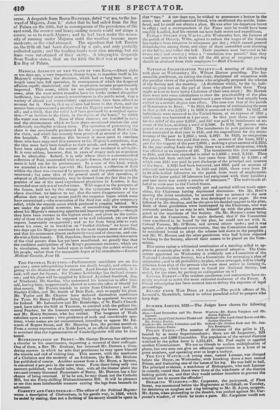THE GENERAL ELECTION.—Parliamentary candidates are on the pi rive ;
some relinquishing honours too dearly bought, and others as- piring to the distinction of the elected. Lord George Cavendish, it is said, will start for Sussex. Sir Thomas Lethbridge has declined Sumner- set; and his place will be supplied by Edward Aysliford Sandford, Esq. of Ninehead ; Mr. Gordon, who announced his intention to offer him- self, having been, inopportunely, elected to serve the office of Sheriff for that county. Mr. Poyntz intends to retire from Chichester ; and Mr. Sinclair Cullen, and Mr. Smith of Dale Park, seek to supply his place. Mr. Taylor and Mr. Chaytor have declared themselves candidates for Tyne, Sir Henry Ilardinge being likely to be appointed Secretary for Ireland. Mr. Labouchere and Mr. Bainbridge, of St. Paul's Church- yard, have taken the field at Taunton, to contend with the gallant Ge- neral Peachey, for the honours recently adorning the brows of himself and Mr. Henry Seymour, who has retired. The burgesses of Wells calculate upon a contest ; two gentlemen of rank and considerable opu- lence, whose names are yet unmentioned, intending to oppose Mr. Ed- wards of Regent Street, and Mr. Harming Lee, the present members. From a strong expression of a Noble Lord, at an official dinner lately, it is surmised that the representation of Cambridgeshire will also be con- tested.
REPRESENTATION or DERRY.—Mr. George Dawson has addressed a circular to his constituents, requesting a renewal of their suffrages. One of them, a Rev. Mr. Graham, has returned Mr. Dawson a thun- dering answer, in which he tells that gentleman he may spare himself the trouble and risk of visiting him. This answer, with the meekness of a Christian and the modesty of an Irishman, the Rev. Mr. Graham has published of course. Another answer from a Mr. Boyes, a layman, is conceived d pest pth in the same terms. From there being only two answers published, we should infer, that, with all the bluster about the two-and-twenty thousand Protestants of Derry, Mr. Dawson has a fair chance of being returned. If he be not, he may thank not the Catholic Bill, but the Forty-shilling Disfranchisement Bill. It will be pleasant to see that most indefensible measure cutting the legs from beneath its advocates.
CORBETT AND CHELTENHAM—The editor of the Political Register wrote a description of Cheltenham, in his gentle way, in 1826, which he *aided by stating, that not a farthing of his money should be spent in. that "wan." A few days ago, he wished to pronounce a lecture in the town ; but some good-natured friend, who recollected the article, Inter- fered, and he could not obtain a place. He was after his departure burnt in effigy ; and a correspondent of the Times says lie would have been roughly handled, had his retreat not been both secret and expeditious. FEMALE STRIKE FOR WAGE5-011 Wednesday last, the farmers of the parish of Oaksey, Wilts, agreed to reduce the wages of the female hay-makers from tenpence to ninepence per day ; which caused general dissatisfaction among them, and some of them assembled next morning at the belfry, and tolled the bell. Their numbers soon increased to be- tween sixty and seventy ; when a " resolution was passed," that they would not return to their work till the old price of teupence per day should be obtained from their employers l—Balls Chronicle.


























 Previous page
Previous page